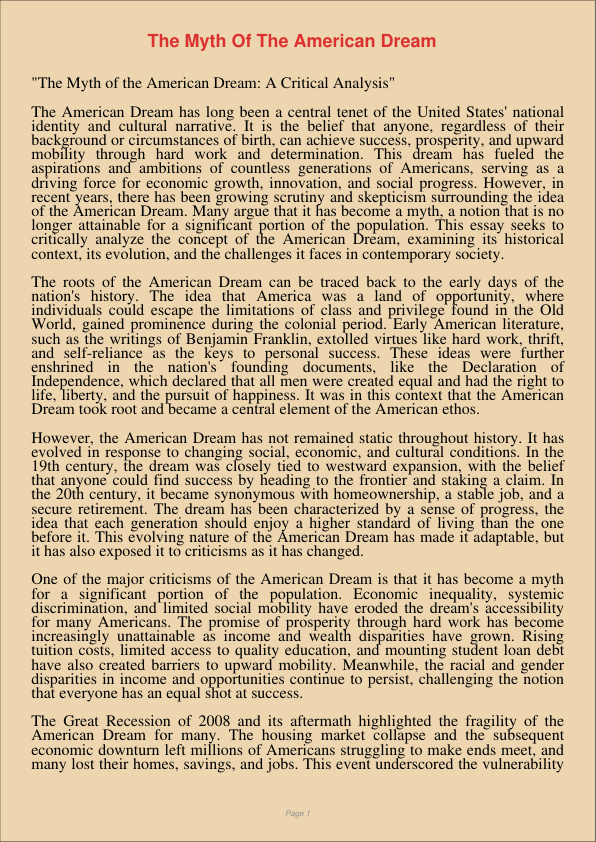“The Myth of the American Dream: A Critical Analysis”
The American Dream has long been a central tenet of the United States’ national identity and cultural narrative. It is the belief that anyone, regardless of their background or circumstances of birth, can achieve success, prosperity, and upward mobility through hard work and determination. This dream has fueled the aspirations and ambitions of countless generations of Americans, serving as a driving force for economic growth, innovation, and social progress. However, in recent years, there has been growing scrutiny and skepticism surrounding the idea of the American Dream. Many argue that it has become a myth, a notion that is no longer attainable for a significant portion of the population. This essay seeks to critically analyze the concept of the American Dream, examining its historical context, its evolution, and the challenges it faces in contemporary society.
The roots of the American Dream can be traced back to the early days of the nation’s history. The idea that America was a land of opportunity, where individuals could escape the limitations of class and privilege found in the Old World, gained prominence during the colonial period. Early American literature, such as the writings of Benjamin Franklin, extolled virtues like hard work, thrift, and self-reliance as the keys to personal success. These ideas were further enshrined in the nation’s founding documents, like the Declaration of Independence, which declared that all men were created equal and had the right to life, liberty, and the pursuit of happiness. It was in this context that the American Dream took root and became a central element of the American ethos.
However, the American Dream has not remained static throughout history. It has evolved in response to changing social, economic, and cultural conditions. In the 19th century, the dream was closely tied to westward expansion, with the belief that anyone could find success by heading to the frontier and staking a claim. In the 20th century, it became synonymous with homeownership, a stable job, and a secure retirement. The dream has been characterized by a sense of progress, the idea that each generation should enjoy a higher standard of living than the one before it. This evolving nature of the American Dream has made it adaptable, but it has also exposed it to criticisms as it has changed.
One of the major criticisms of the American Dream is that it has become a myth for a significant portion of the population. Economic inequality, systemic discrimination, and limited social mobility have eroded the dream’s accessibility for many Americans. The promise of prosperity through hard work has become increasingly unattainable as income and wealth disparities have grown. Rising tuition costs, limited access to quality education, and mounting student loan debt have also created barriers to upward mobility. Meanwhile, the racial and gender disparities in income and opportunities continue to persist, challenging the notion that everyone has an equal shot at success.
The Great Recession of 2008 and its aftermath highlighted the fragility of the American Dream for many. The housing market collapse and the subsequent economic downturn left millions of Americans struggling to make ends meet, and many lost their homes, savings, and jobs. This event underscored the vulnerability of the dream, as many who had followed the traditional path of homeownership and steady employment found themselves struggling to recover.
In addition to economic challenges, the American Dream has also faced cultural and environmental criticism. The pursuit of material success and consumerism, often associated with the dream, has been criticized for contributing to environmental degradation and a sense of spiritual emptiness. Some argue that the relentless pursuit of wealth can lead to a sense of alienation and disconnection from meaningful, community-oriented goals.
In conclusion, the American Dream is a complex and multifaceted concept that has played a significant role in shaping the United States. While it has evolved over time, it has also faced growing scrutiny and skepticism. The myth of the American Dream is that it remains universally attainable in contemporary society. Economic inequality, systemic discrimination, and social mobility challenges have created barriers for many Americans. However, the dream’s enduring power lies in its ability to inspire individuals and communities to strive for a better future. It is a dream that continues to evolve and adapt in response to the changing needs and aspirations of society. Its mythic quality endures even as its reality remains elusive for many.

「真诚赞赏,手留余香」
真诚赞赏,手留余香
使用微信扫描二维码完成支付
